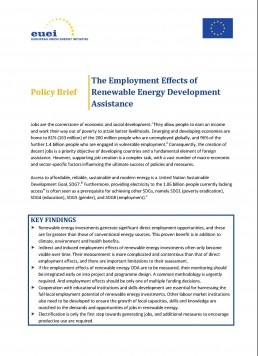
Consideration of the entire spectrum of development impacts from electrification will be a defining feature for the long-term success of support for SDG7. This policy brief sheds light on how employment can be fostered through the provision of official development assistance (ODA) for energy.
Jobs are the cornerstone of economic and social development. The creation of decent jobs is a priority objective of developing countries and a fundamental element of foreign assistance. However, supporting job creation is a complex task, with a vast number of macro-economic and sector-specific factors influencing the ultimate success of policies and measures. This also poses a challenge in accurately assessing the employments impacts as a result of energy-oriented development assistance. Yet, it is established that access to affordable, reliable, sustainable and modern energy does have positive development impacts, which is why it forms a United Nations Sustainable Development Goal, SDG7.
The report finds that Least Developed Countries (LDCs) and areas with high energy access deficits need more support, including through distributed energy technologies. Furthermore, the national capacities of LDCs for monitoring and assessment of employment impacts are still insufficient and require support if they are to report on these to the international standards being set. Additionally, the current finance gap requires targeted approaches to mobilise additional finance flows and leverage private capital if SDG7 is to be achieved.
